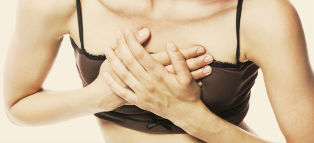If the evil of the chest and in the back, you probably have problems with the internal organs located in the chest, either with the spine. If you have this area previously have been a trauma, for example, fractured ribs, the wound of the chest, injury to the spine, then from time to time resulting from pain, can be the consequence.
It also happens that the pain is painful to the man for a long time, and pain killers provide only temporary relief, in this case, the more likely it is the chronic, progressive disease requiring immediate treatment. We look at some of the disease, symptoms which is a pain in the chest, entrust in the back.
If the evil of the chest and in the back: possible causes

The organs in the chest are fairly close to each other, and pain occurring in a body, can spread to the other, to give to the different parts of the body, for example, in the lower back, upper arm, neck, stomach. Sometimes, pain in the chest, give in the back, this is the case, when the following diseases:
1 because of Problems with the skeleton
The problem with the skeleton, and it is the curvature of the spine, such as scoliosis, lordosis and kyphosis. They are all at the later stages are accompanied not only visible defects, such as, for example, asymmetry of the waist, shoulder blades and shoulders at the scoliosis and painful sensations. Usually, the pain occurs in the chest, radiating to the back, sometimes in an arm or the neck, it tries to take a more comfortable position, usually asymmetrical in the spine. When the curvature of the spine for a long time do not correct the man loses the ability to be in the right position: with a smooth back, the symmetrical shoulders, not that she is sagging in the lumbar region and thoracic division, and each year the situation worsens. Also, the pain in the chest, says in the back can be caused by the inflammation of costal cartilage, or as the locals call it the disease – the disease Tietze. If it is at the junction of the cartilage (ribs) in the sternum induration, swelling and pain. In the case of pressure on it, the pain increases, as well as coughing and laughter. Most often, pain in the chest, radiating to the back, especially during changes in body position.
2 reason - Diseases of the digestive organs
The diseases of the organs of digestion can be accompanied by pain in the chest, which gives in the back. In particular for the development of cholecystitis in the absence of treatment, a sharp pain in the chest, stretches the back and door tinea nature, later, nausea and fever, a body which is accompanied with fever. A spasm of the esophagus, also causes pain in the chest, making it in the back. When that painful sensation had a pressing nature, and their emergence is linked to the ingestion of food. In certain cancers, diseases of the organs of digestion may occur pain in the chest, entrust in the back, it is very important to as quickly as possible to make a diagnosis and start the treatment. Unfortunately, when the cancer of the organs of digestion, the pain is more likely to occur when the tumor has already hit a large area.
3 because of Diseases of the heart and blood vessels
For an angina attack (the condition resulting from the lack of blood supply to the heart muscle) characteristic pain in the chest, entrust in the back. When the pain is concentrated in the left part of the body and are accompanied by shortness of breath, lack of air and the sense of fear. Most often, angina pectoris due to excessive physical activity in individuals not trained, most often in the elderly. Also, if the evil of the chest, radiating to the back, this may be the sign of a serious condition, and it is, the massive embolism of the pulmonary artery. When the disease occurs the blocking of the opening of the pulmonary arteries, what happens to oxygen insufficiency. During the attack of a man not enough air, he feels a sharp pain in the chest, making it in the back, and the breathing becomes quick and easy.
If the pain in the chest, radiating to the back, and harass you quite often, it is more advisable to pass an exam, especially if it is accompanied by symptoms such as lack of air, fainting, or signs of gastro-intestinal tract.


























